Reflecting on The Band’s Break-up and Levon’s Death
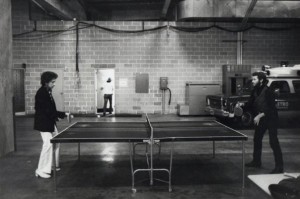 Among the pieces of journalism and commentary I’ve read about Levon Helm since word of his terminal condition was released by his family last week, and then since his death on Thursday, this one by Mark Guarino is the best yet. I recommend you read it, for it captures the injustice that accompanied The Band’s dissolution, and how Robbie Robertson and the businesspeople around him really did treat his four bandmates inequitably. According to Levon, in his memoir This Wheel’s on Fire, Robbie claimed all the publishing royalties on most of their songs, compositions that had famously been workshopped by all five of them, beginning at the Big Pink house, and in later sessions. For the sake of argument, even if Robbie believed he was genuinely responsible for most of the songwriting, why not assert a claim on a larger share of the royalties and then split the remaining percentage four ways? Instead, he just walked away with it all on most of their repertoire and by the time Levon received his cancer diagnosis in 1998, he had to declare personal bankruptcy and nearly lost his house. I know Robbie came to his bedside this week, and if Levon really reconciled with him that’s great, but it’s hard not to see Robbie’s visit as some self-serving absolution. It certainly adds to the sadness of Levon’s passing to say this, but I believe it’s true.
Among the pieces of journalism and commentary I’ve read about Levon Helm since word of his terminal condition was released by his family last week, and then since his death on Thursday, this one by Mark Guarino is the best yet. I recommend you read it, for it captures the injustice that accompanied The Band’s dissolution, and how Robbie Robertson and the businesspeople around him really did treat his four bandmates inequitably. According to Levon, in his memoir This Wheel’s on Fire, Robbie claimed all the publishing royalties on most of their songs, compositions that had famously been workshopped by all five of them, beginning at the Big Pink house, and in later sessions. For the sake of argument, even if Robbie believed he was genuinely responsible for most of the songwriting, why not assert a claim on a larger share of the royalties and then split the remaining percentage four ways? Instead, he just walked away with it all on most of their repertoire and by the time Levon received his cancer diagnosis in 1998, he had to declare personal bankruptcy and nearly lost his house. I know Robbie came to his bedside this week, and if Levon really reconciled with him that’s great, but it’s hard not to see Robbie’s visit as some self-serving absolution. It certainly adds to the sadness of Levon’s passing to say this, but I believe it’s true.
Now, as many articles have pointed out, Levon did mount a great second act with the Midnight Ramble, the Grammy-winning albums, and playing and singing with his daughter Amy. But that happiness stands in sharp contrast to the fact that nothing like that happened for Richard Manuel and Rick Danko, and this is where Guarino’s Christian Science Monitor article, “Levon Helm and The Band: a rock parable of fame, betrayal, and redemption” is most valuable.
Manuel’s post-breakup troubles ended with his 1986 suicide, during a revival tour of The Band sans Robbie. Guarino tells us that Levon is the one who found him after he’d hanged himself. As for Danko, he died at fifty-one from complications of heart disease. Guarino, quoting from the memoir, reminds us of Levon’s words: “If Rick’s money wasn’t in their pockets, I don’t think Rick would have died because Rick worked himself to death.… He wasn’t that old and he wasn’t that sick. He just worked himself to death. And the reason Rick had to work all the time was because he’d been [expletive] out of his money.” To be fair, it should be admitted too that a hard-partying lifestyle would have contributed to Manuel’s and Danko’s early demise (see Danko’s stoned moments with Janis Joplin in the rolling concert film “Festival Express,” if you have any doubt how much Rick loved getting high), but it doesn’t change the fact that playing half-empty dives to keep making a living, for a musician who once played to 600,000 at Watkins Glen with the Allmans and The Dead in ’73 (which I personally attended*), had to have depressed him and Manuel to a point where continued substance abuse was, if not inevitable, unsurprising.
All this sadness acknowledged, it is comforting to see how sadness brings us all together, bridging intervening years. After posting on Facebook and Twitter over the past week, I’ve heard from high school friends, such as Seth Foldy of Friends School and hometown Cleveland pals, like Eric Broder. Eric referred me to the Drive-by-Truckers’ Danko-Manuel song, with its haunted lyrics, “Got to sinking in the place where I once stood/Now I ain’t living like I should . . . Richard Manuel is dead”.
It was fitting to me that the family’s first message about Levon’s illness, while originating with his wife and Amy (who I had the privilege of hearing sing a few months ago with Blackie and the Rodeo Kings**, a performance I wrote about here), was immediately passed along on social media by “Bob Dylan and The Band.” And then, after Levon died, this appeared on bobdylan.com: “He was my bosom buddy friend to the end, one of the last true great spirits of my or any other generation. This is just so sad to talk about. I still can remember the first day I met him and the last day I saw him. We go back pretty far and had been through some trials together. I’m going to miss him, as I’m sure a whole lot of others will too.”
In honor of The Band and Bob Dylan, and yesterday’s Record Store Day, I’ve taken photos of all my LPs and CDs coming from their great musical enterprise, even Robbie’s first solo album. (click on thumbnails for full panorama of album images
* From that great weekend, I recall that a heavy thunderstorm with distant bolts of lightning let loose on the Saturday night, and The Band, then playing, had to flee the stage out of safety concerns. When the downpour had ebbed, Garth Hudson came out first and sat at his organ beneath a protective little canopy, launching into an unforgettable rendition of the solo that opens “Chest Fever, a song on “Music From Big Pink,” “Chest Fever.” These moments are forever captured on one of the CDs photographed below, “The Band- Live at Watkins Glen.”
**From Blackie and the Rodeo Kings, Colin Linden, who knew and had played music with Levon, was interviewed by Jian Ghomeshi on the CBC Radio program ‘Q’ the day after his friend’s death, as was Garth Hudson, conversations that can be heard via this link.
- Music From Big Pink, The Band, Stage Fright, Cahoots (LP front covers)
- Music From Big Pink, The Band, Stage Fright, Cahoots (back covers)
- Northern Lights, Southern Cross; Islands; Robbie Robertson (LP front covers)
- Northern Lights, Southern Cross; Islands; Robbie Robertson (back covers)
- Planet Waves (LP front cover)
- Planet Waves (back cover)
- Bob Dylan/The Band, Before the Flood; The Basement Tapes; The Last Waltz (CDs)
- The Band-Live at Watkins Glen; The Best of the Band Recorded Live; Jericho

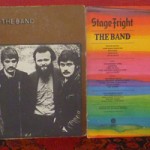
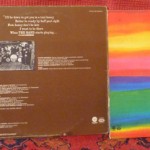
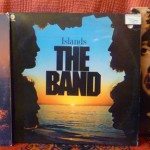
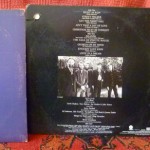
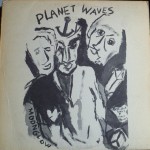
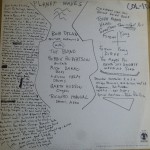
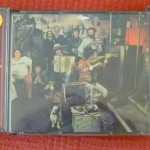
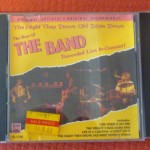

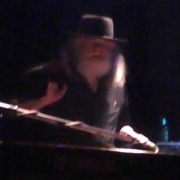
Beautifully done, Phil.
Thanks, Martha.
Now, it’s my turn to tell you what a great job you did on this blog, Philip.
Thanks a lot, Mark. I’m glad the piece hit the mark for you. Fun having a blog these days, huh? Best, Philip
Rick and Richard both got paid for writing songs, why shouldn’t Robbie also get paid for his work? Rick, Richard and Levon chose to be addicts. There deaths are in no way Robbie’s fault. It is irresponsible of you to suggest otherwise.
Thanks for visiting my blog and commenting on this post from 2012. I’m curious how you know with such certainty what the financial arrangements were among members of The Band. Though I quoted Levon on the causes of the deaths of Richard and Rick, I did not write that they were Robbie’s “fault.” I wrote, “To be fair, it should be admitted too that a hard-partying lifestyle would have contributed to Manuel’s and Danko’s early demise.” I do believe the record shows that Rick’s financial conditions contributed to his decline. As to whether people “choose” to be addicts, that is a harsh judgment I do not share with you. Thanks again, Philip
Bingo.
There was ample opportunity, according to Robbie in his new book, for the three drug addicts to bring in songs. They chose not to.
And for the record, composition consists of words and melody. Anything else is the arrangement. Ever hear Paul McCartney’s “And I Love Her” from “A Hard Day’s Night?” Well, the iconic intro guitar pattern was entirely George Harrison’s. Did he moan and complain that he didn’t get a co writing credit? Nope.
Actually, George left the Beatles because Paul was overbearing and too controlling
Robbie took all the cash
and hardened his heart to the calls for help from the guys who made him.
The other guys did not make Robbie. Certainly, their talent cannot be diminished, they ALL brought something valuable to the table, and they help make The Band. However, Robbie was the one with the vision, ambition and work ethic. They all had music in their blood, and I believe they all would have found a way to make music. Robbie had big dreams as a child growing up semi poor with a physically abusive step dad. Ronnie Hawkins said in an interview that Robbie worked harder any anybody.
Just because they was addicts it doesn’t mean they didnt do their part in writing the music. They all wrote it therefore they should of shared the royalties evenly. That would of been right.
Yep, definitely should have shared the wealth in a more equitable fashion.
Not sure the Levon, Rick and Richard chose to not write songs. After Robbie, Richard wrote the most, Rick wrote a few and co wrote at least one song with Bob Dylan. I believe it is a talent you are born with. Robbie said in an interview some have 1 song in them, some 5 and some hundreds. I think if Richard had not been so addicted he could have written more. What Levon left out in his book, I believe is that they all got 20 percent of the publishing rights, although the others except for Levon sold their share to Robbie. He also left out how reckless he was with money, and spend it whether he had it or not. According to Barney Hoskyns biography of The Band, they ALL made a lot of money, much was wasted on drugs and bad money management.
There is much material in the public domain about this issue but in your piece you have not made any attempt to be objective only quoting pro-Levon sources. You may not have noticed but in the comments section of the CSM article you relied on is a complaint from Libby Titus, Levon’s former partner and Amy’s mother, about the unfairness of that article. This is what Libby told Barney Hoskyns about Levon’s relationship with Robbie: “The story of Robbie and Levon is much more complex than the bloggers and the press understand,” Libby Titus-Fagen wrote me on April 25. “I can tell you that for the years I was with Levon, from 1968 to 1974, they each shared a part of the other’s soul. One would start a sentence, pause, and the other would finish it. They had their own alphabet, their own clock, their own DNA, a Levon-Robbie double helix. When I called Robbie to say Levon was dying, he was stunned, shattered—he thought Levon had beaten the cancer. Robbie flew to New York to say goodbye. Amy, Donald and I were in the waiting room, and I don’t know what Robbie said to Levon for the long time he spent by his bedside. All I know is that there’s a side to this life-and-death song no one has heard. Levon wouldn’t want this bitterness to ramble on any longer.”
It is a pity commentators don’t listen to Libby’s words.
Robbie should be ashamed whatever he tells himself is shameful
wallsend, what could you possibly know abouit this? You make a fool of yourself by defending Robertson. You know nothing.
Mike, you are the one that know nothing. Levon’s version is very one sided. Read Barney Hoskyns biography of The Band, it will give you a more balanced view. According to Hoskyns they ALL made a lot of money. Levon spent money recklessly, whether he had it or not, Rick, Richard and Levon all spend a lot of money on drugs, it also seems they were not good at managing money. They all got 20 percent of the publishing rights, except for Levon, the other willingly sold their share to Robbie.
Robbie Robertson is a scum sucking slut compared to Levon Helm. He doesn’t know “soul”s address. As John Lennon said, ” How do you sleep at night?” And I wonder, how do you?
Danko died at 56, not 51.
Further, Robertson did not “walk away” with royalties, whatever that means. As Levon documents in his book he bought the rights to The Band from each member for a million dollars each. Was it stupid of them to sign the deal? Probably. But if you sign a contract, well then no you did not “die with your money in Robbie’s pockets.” I mean, grow up.
They re-formed The Band and went on the road again, which their deal with Robbie stipulated they could not do (also in Levon’s book.) and Robbie turned a blind eye. Not a huge move, but it’s something.
Blaming Robbie for a stupid contract you willingly signed and for the fact that you made a mess of your life after your collaboration
It wqs well known all round Woodstock that Rick had a huge drug problem. He’d bee seen at all hours of the night and morning, sitting out in frot of the Grand Union, looking for his friends to get high with. its very sad, but it wasnt poverty that killed Rick.
I absolutely love Rick, his voice breaks my heart on some songs, his bouncing and dancing on stage is priceless, at The Last Waltz he was so good looking, he had an endearing personality and so much charisma. However, unfortunately he was self destructive to a certain degree. His near fatal car accident in the late sixties left him in constant pain, and I believe that contributed to his addiction to heroin.